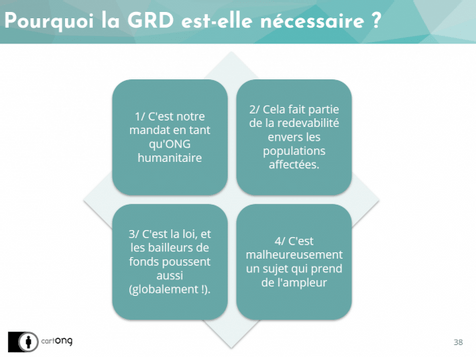Training cycle on responsible data management

“When we started discussing about this training with some of our partners, the idea was to offer a remote training for a few Information Management field coordinators of each organization. When the information started to circulate within their respective organizations, the number of requests to participate was so high (it surprised even the focal points themselves!) that we decided to adapt the format and make it open to a wider audience to increase the impact of the training. A training to so many, with so many different backgrounds and understandings of responsible data management has of course been a challenging endeavor, which wouldn’t have been possible without the support of the focal points from each participating NGO, but we also learned a lot and it confirmed that humanitarian actors feel a real need for support on such an essential topic,” Maeve de France, Information Management Project Manager at CartONG and responsible for the training course.
This training course knocked the scales from my eyes regarding certain aspects of data protection. I learned a lot of things that are likely to change my data management practices.
Cyberattacks, data leaks, or superficial treatment of sensitive data which led to harmful consequences for specific groups or communities: similar stories made the news more and more in recent years. If weak data protection and responsible data management practices can have dangerous consequences for anyone, it is even more the case in humanitarian projects. Humanitarian organizations often find themselves managing sensitive data, working with communities already at risk, navigating complex, ever-changing, and sometimes conflicting legal frameworks, with little time and knowledge to be able to apply them to their projects. At the same time, responsible data management practices are essential in the humanitarian field to respect the “do no harm” mandate of any organization and to be accountable to the populations affected and to donors. In addition, the widespread use of digital technologies to collect and process data during humanitarian crises further increases the risks for the concerned populations.

This is where the training organized by CartONG comes into play, to help field and HQ humanitarian practitioners navigate this complex environment by sharing concrete examples, tips, peer-to-peer testimonials and good practices. With a mixed approach, covering the main theory around data protection and responsible data management (RDM), added to interactive exchanges, practical exercises, and the interventions of field experts, the training allowed the participants to delve into a topic often deemed complex but essential and to use the acquired knowledge to improve their organizations’ day-to-day data management practices.
The course made me aware of the broad spectrum of responsible data management. The theoretical side combined with practical reflection, group discussions, and the provision of tools (as well as all the resources you make available) is a skillful blend that will enable me to push these questions and I hope to structure these issues on the mission. Many thanks for this!
The training taught me the importance of RDM and how we should apply its principles in our day-to-day work in order to ensure that we do no harm to our beneficiaries.
“In line with CartONG’s approach of closely collaborating with the international solidarity sector as a whole, this training has been an invaluable opportunity to discuss with humanitarian actors the day-to-day issues they face in applying responsible data principles in their projects. After five weeks of intense work and fruitful exchanges, the feedback we received has been very positive, and 99% of participants felt they were provided with useful knowledge on the topic. We strongly believe this training helped raise awareness among humanitarian field practitioners and will improve their day-to-day practices towards a more responsible data management approach.” said Lise Clerc, Information Management Project Manager at CartONG and co-responsible for the training course.
This training, funded by the “Support Fund for Structuring Humanitarian Initiatives” of the Ministry for Europe and Foreign Affairs’ (MEAE) Crisis and Support Centre, is not a stand-alone effort; it is part of CartONG’s larger work to reinforce the humanitarian sector’s capacities and is conducted in the framework of its initiative to strengthen NGOs’ program data practices.
